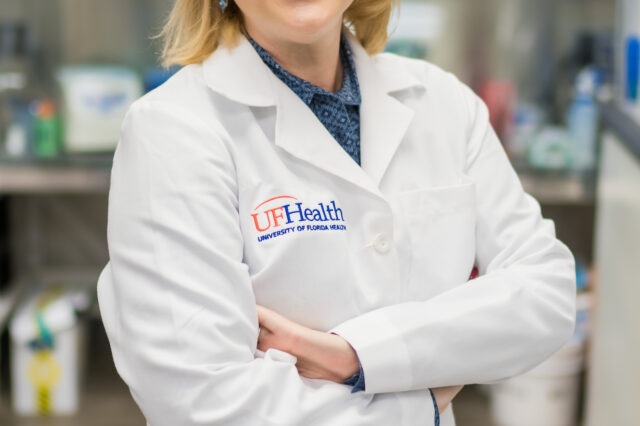UF Health’s chief epidemiologist answers common questions about the COVID-19 vaccine

For more information, visit UF Health’s website on COVID-19: https://coronavirus.ufhealth.org/vaccinations/
As the new COVID-19 vaccines are being put to use throughout the country, some people may have questions related to getting inoculated and healthy practices they should follow afterward. Nicole M. Iovine, M.D., Ph.D., chief epidemiology officer for University of Florida Health Shands Hospital system, provides answers to several prominent concerns that are being raised on various forums.
Question: If someone already had COVID-19, should they still get the vaccine?
Answer: Yes! The vaccines generate a strong immune response against a key protein the virus needs to cause infection. These are called neutralizing antibodies. In contrast, natural infection triggers an immune response against many parts of the virus, some of which would not protect against infection. So, the thought is that it is beneficial to have the immune system make these neutralizing antibodies to best protect against another infection.
Question: What happens if someone gets vaccinated now but a more effective one comes out later? Can I get two vaccines?
Answer: The currently authorized Pfizer vaccine has greater than 90% efficacy, meaning that more than 90% of vaccine recipients in the studies were protected from COVID-19 infection. This is extremely high, and similar to the most effective vaccines for other infections. Over time, it is possible that we may learn that certain populations of people might respond better to a particular vaccine. However, it will likely take many months before that is known and I would not recommend waiting to get the vaccine.
Question: For those who get vaccinated early, should they still continue taking the same precautions as before such as mask wearing and social distancing?
Answer: Vaccinated people absolutely need to continue to wear personal protective equipment, practice social distancing, avoid large gatherings and continue with hand hygiene. That’s because the vaccine cannot prevent 100% of all infections in vaccinated people. Although the studies indicate efficacy rates greater than 90%, a small percentage of people will still develop COVID-19. Also, we don’t yet know if vaccinated people can still transmit the infection to others. Over time, we expect to learn more about that. Yet another reason to keep taking precautions is that some people might have a lesser immune response than others, meaning they could be less protected by the vaccine. Those factors could include having a suppressed immune system, taking certain medications, being older, or even other things that we don’t yet know about. Finally, the vaccine is currently authorized those who are at least 16 years old, so the younger population cannot be vaccinated at this time.
Question: Some people will experience negative vaccine side effects. Why is that not a bad thing?
Answer: Some people will have soreness at the injection site, similar to what can happen with other vaccines, like the flu shot. A smaller percentage of people may develop other mild symptoms such as headache, fever or a sense of feeling unwell. These reactions occur because your immune system is responding to the vaccine. Even though it may feel uncomfortable, these reactions actually are a good sign that your immune system is working. These reactions should improve after 24 hours and can also be treated with over-the- counter remedies such Tylenol.
Question: Some people are concerned about how quickly the vaccines have been designed and produced. What do you say to those people?
Answer: There has been tremendous support and resources dedicated to the COVID vaccine effort. That is why the vaccine was able to come to fruition so quickly. It is important to remember that all of the necessary studies on efficacy and safety have been completed, just as if the vaccine had taken years to produce. All of the regulatory oversight on vaccine production was also unchanged. In summary, all of the required steps to ensure vaccine safety have been completed. The speed at which those steps were completed is due to the unprecedented amount of attention and resources that were devoted to this effort.
Question: Where can I go for more information on the COVID-19 vaccine?
Answer: There are several resources, including UF Health’s coronavirus website. the Centers for Disease Control and Prevention’s Frequently Asked Questions about COVID-19 and the Food and Drug Administration. Media contact: Ken Garcia atkdgarcia@ufl.eduor 352-273-9799.
About the author
